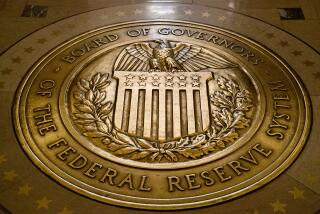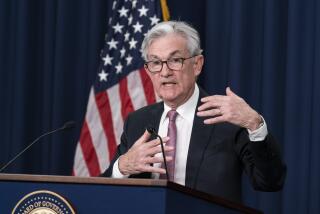Greenspan Vows to Resist Political Pressure : Fed Chairman Nominee Says He Would Not Bend to GOP Demands
- Share via
WASHINGTON — Alan S. Greenspan, nominated by President Reagan to succeed Paul A. Volcker as chairman of the Federal Reserve Board, vowed Tuesday to resist any election-year pressure to boost the economy to help the Republicans retain the White House in 1988.
Elsewhere on Capitol Hill, in a day of testimony symbolizing a new era in the nation’s economic policy, Volcker predicted that Greenspan will have “challenge aplenty” in the years ahead in the effort to keep inflation under control.
Greenspan, 61, appeared before the Senate Banking Committee, which must determine whether to recommend that the Senate confirm him. “My actions may turn out to be wrong,” he told the committee, “but it would certainly not be on the basis of politics but economics.”
Committee Chairman William Proxmire (D-Wis.) criticized Greenspan for expressing strong free-market views on a wide variety of issues. But he told Greenspan that the Senate would overwhelmingly approve him to take over the crucial post held by Volcker for eight years.
In his parting testimony before a House Banking subcommittee, Volcker said he expects little change in the Fed’s monetary policy because of recent signs that the economy’s health is improving.
But Volcker, who announced June 2 that he was resigning, cautioned that the Fed faces a “rather critical period” ahead.
“It is much harder to deal with inflation once it has some momentum,” Volcker said. “I think we have a chance that it will subside again and should subside again relatively soon if we can maintain restraint on the cost and wage front.”
Volcker, who will be remembered as the nation’s most aggressive inflation fighter of recent years, despite intense political pressure to relent, said that he would advise Greenspan to “scratch, bite, complain--whatever is necessary” to convince Congress of the importance of the Fed’s independence from the Administration and Congress.
“To preserve the basic structure of independence for the monetary authority,” Volcker said, “I don’t think there’s anything more important than that.”
Greenspan, under questioning by Democratic lawmakers, said he does not expect there to be any direct political pressure to ease up on the Fed’s anti-inflation efforts in order to let the economy grow more strongly than it otherwise might during the election year.
Greenspan, who has close Republican ties and served as President Gerald R. Ford’s chief economic adviser, added that he would be willing to risk an economic downturn if necessary to ensure the nation’s long-term health--even during next year’s election campaign.
“I obviously would reject” any politically motivated White House or congressional requests, Greenspan said. “I would absolutely resist them.”
Proxmire, complaining that the central bank’s independence has been undermined because President Reagan has now appointed all of the seven Fed governors, challenged Greenspan to maintain a “strong, steady, anti-inflationary policy.”
The Fed will be faced with politicians “pushing you in one direction toward an easy money, expansive policy that will keep the recovery going, preferably at an expansive clip right up to next November,” Proxmire said. “Are you the man who can say no to the Administration and the Congress?”
Greenspan promised, as he did when Reagan nominated him, to maintain Volcker’s monetary policies. “I would say that the type of policies that Chairman Volcker has initiated are, as I said previously, essentially on target,” he said.
But one stark difference between Greenspan and Volcker emerged on the contentious issue of bank regulation.
Greenspan said that he favors allowing non-financial institutions to own banks as long as a “fire wall” can be constructed to prevent the banks from subsidizing commercial investment in their corporate affiliates. Volcker, by contrast, has resisted greater financial deregulation and told lawmakers that his biggest disappointment as Fed chairman was the failure to see comprehensive banking legislation win passage.
More to Read
Get the L.A. Times Politics newsletter
Deeply reported insights into legislation, politics and policy from Sacramento, Washington and beyond. In your inbox three times per week.
You may occasionally receive promotional content from the Los Angeles Times.










